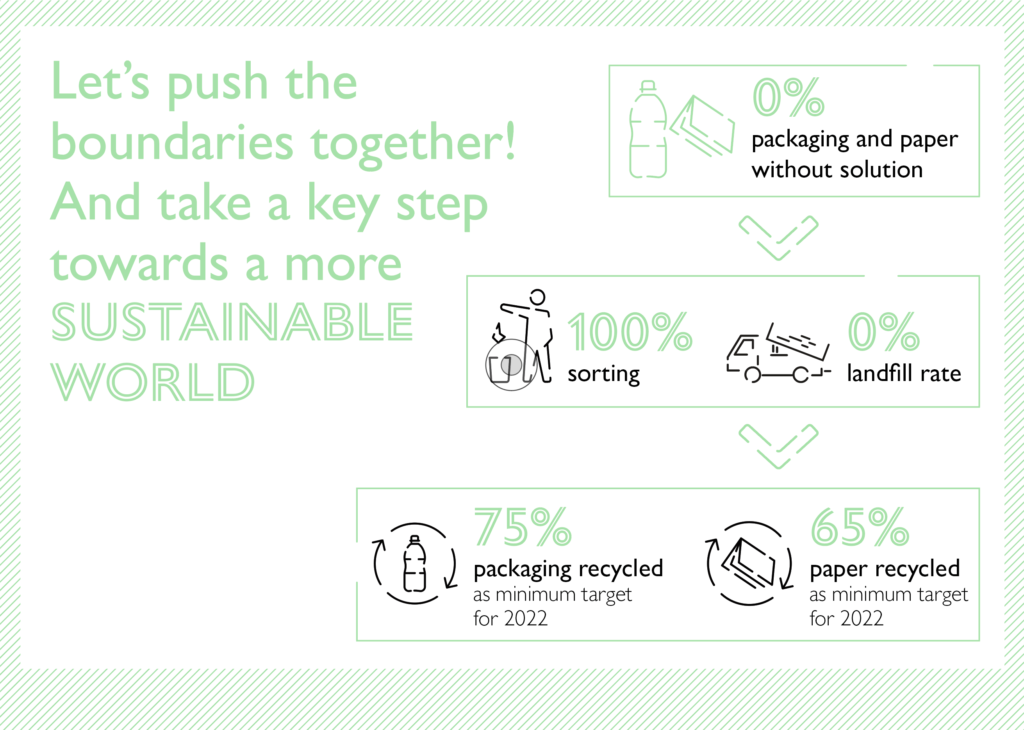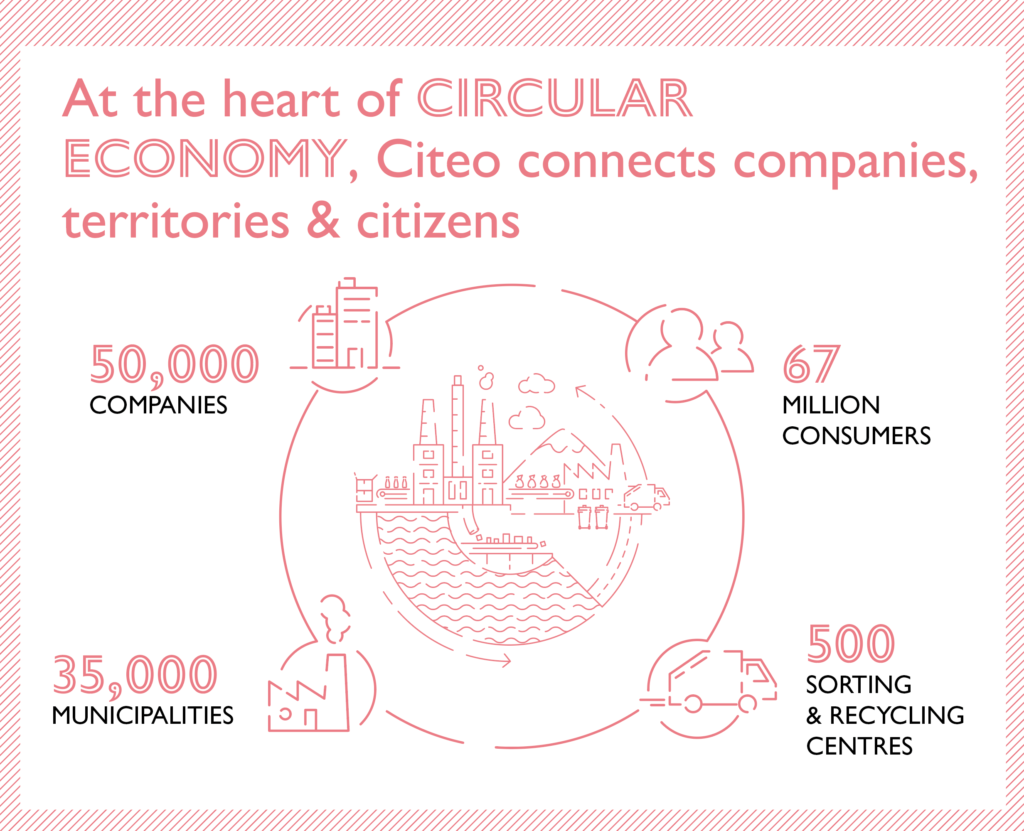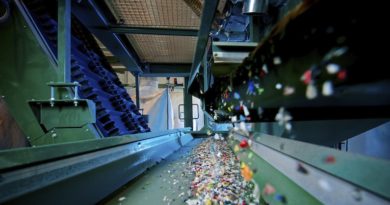
Citeo is committed to achieving a sustainable Europe through circular economy

“Citeo’s ambition is to build a more sustainable world thanks to the Circular Economy. To achieve this, we work with all stakeholders – companies, local authorities, recycling operators and industries, associations and citizens – on both the French and European scales”
European roadmap towards a Circular Economy
The European Union has recently shown an undeniable commitment in transitioning towards a Circular Economy. This was shown in its recently-adopted Circular Economy Package, and the announcement of the European Plastic’s Strategy. At the World Economic Forum in Davos, the EU Commission was awarded the 2019 Circular Economy prize, adding to its diligence on the topic and providing it with international recognition from the highest experts. This, in turn, demonstrates a penchant towards European legislation which meets citizens’ demands; a fact most highlighted by the recent manifestations calling for climate protection across the Member States.
Following the European election, the next commission will, without any doubt, build on the circular economy momentum to go forward to fully close the loop and push further the transition towards Circular Economy. Circularity implies to rethink deeply the production and consumption of goods. EU policymakers will have to engage closely with a broad range of stakeholders representing the entire value chain. It’s the only way to implement the new legislation efficiently.

Citeo, the French company in charge of the Extended Producer Responsibility for household packing and graphic papers, is delighted to be supporting the EU Commission in shifting the paradigm. By closely collaborating with all stakeholders, Citeo bridges brand owners with, packaging producers, recyclers, retailers, local authorities, etc. . Thanks to the mechanisms we have set up, 70% of household packaging and more than 55% of graphic papers are recycled in France. With this position, Citeo can be a real game changer for a circular growth.
Citeo’s role in the transition
In revising the Waste Framework Directive, the EU Commission took opportunity for a level-playing field for the Member States’ waste management systems. This was channeled via ambitious yet achievable binding recycling targets. This is an opportunity for Citeo to enable greater recycling for household packaging through an efficient Extended Producer Responsibility (EPR) scheme. Through this mechanism, which stems from the polluter-pays principle, companies that place certain types of products on the market bear the majority of the costs associated with their end-of-life.

Nevertheless, these efforts will only result in a genuinely sustainable future if all stakeholders collaborate always more. With it’s particular position, in the heart of the ecosystem, Citeo can play a key role of catalyst, developing appropriate solutions to achieve the new ambitious recycling targets and beyond.
This demands in particular that innovative recycling technologies and eco-design both be fostered and promoted. In this perspective, Citeo recently launched an international forum on new plastic solutions with Éco-Entreprises Québec on innovative recycling technologies at both side of Atlantic Sea which illustrated the global industrial dynamics around these new technologies.
The transition need to be complemented with adequate monitoring, in order to inform and improve the recycling performances, and citizen information. All this, in a common effort to push boundaries towards a more sustainable world both on the French and European level.
Towards a Circular plastics’ approach
In striving for a Plastics’ Stragtegy and, with the recently-adopted Single-Use of Plastics’ Directive, the European Union is pushing both citizens and stakeholders to rethink how they use and manage the material.
Citeo, fully endorse the EU’s vision for a plastics’ Circular Economy – urging for the material to transform from waste to economically-, socially-, and environmentally-beneficial resource. As such, Citeo endeavours for improving the circularity of all type of packaging, while also ensuring its net environmental improvement over the product’s life-cycle.
Improving the competitiveness of plastics recycling also means developing opportunities for recycled plastics. This can be achieved by influencing the demand, for example by stimulating markets for products already incorporating recycled plastic. It would be quite easy to encourage the use of recycled plastics by inserting specific clauses in public procurement. As such, Citeo actively participates in the Circular Plastics’ Alliance initiative which aims to increase the demand for recycled plastic.
Citeo already works hand-in-hand with associations and brand owners for improving recycling rates and decreasing the littering. We are engaged in several awareness-raising campaigns and actively supporting citizens initiatives that fight against marine litter.
Challenges Ahead
Citeo is already anticipating issues that need to be urgently tackle, especially the fight against marine litter.
Regarding the new disposal on litter clean-up as agreed in single use plastic directive, Citeo would suggest to clarify the role and responsibilities of each actor (citizen-consumer, municipalities and EPR organisation), the geographical scope and scale of clean-up activities limited to activities undertaken by public authorities. Citeo would also suggest to incentivise the measure by adapting costs according to littering and setting an evidence-based calculation.
To further develop integration of recycled plastics we call the EU Commission to develop legislation for the regulation of the interface between products, chemical substances and waste. We also believe that the EU Commission should ensure funding’s for investments for the development and the modernisation of recycling infrastructures to help Member States reaching the targets and implementing legislation.
Citeo also tries to be ahead of the new challenges arising from the development of the rapidly growing part of the market of the e-commerce. E-commerce generates a lot of packaging that is handled by the municipal waste management service. But the question of who puts the product on the market remains unclear and many packages do not contribute to their end-of-life through EPR mechanisms. Citeo calls to regulate this « empty space » which leads to an increasing freeriding effect.
In the field of ecommerce, another issue is the dismantling of the carton packaging which makes it harder to recycle. A logo to prevent consumers from dismantling those packaging would be very useful.
Citeo also call the EU Commission to address pending regulation to ensure coherence for EPR fee modulation criteria, to provide a clear definition for “recyclability” & reusability” and to agree on the methodology of the calculation of the recycling point to ensure the comparability of recycling rates between the EU’s Member States.
In an integrated market, circularity of packaging is obviously a European concern. The power of 500 million consumers could be increased tenfold if they have access to the same information. That’s why a debate should be launch on the introduction of a pan-european logo for packaging recycling. Citeo suggests that such logo should symbolise the recyclability of packaging rather the actual collection instructions.
Citeo remains committed to achieve a sustainable future through Circular economy by contribution to maximising the resource efficiency of packaging and graphic papers.
| Citeo recommendations for the next European Commission – Continuing dialogue with stakeholders of the european circular economy agenda; – Guaranteeing financial help and european projects to improve the end of life for packaging and graphic papers; – Supporting innovation for the development of new materials to reach the collection and recycling targets set by the European Union – Supporting Member States transposing the circular economy package and the single use plastics directive into national law; – Clarifying of technical pending issues (e.g guidelines on EPR fees eco-modulation, recycling rates calculation methodology, collection and sorting); – Ensuring the circularity of packaging via efficient product design, new recycling solutions and prevention of littering. |




